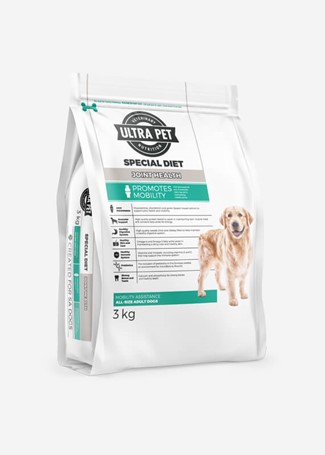
As winter approaches, many dog owners notice their furry friends experiencing increased stiffness and discomfort in their joints. Just like humans, dogs can suffer from joint issues, especially as they age or if they have underlying conditions like arthritis. Understanding how winter affects your dog’s joint health and taking proactive steps to alleviate their discomfort can make a significant difference in their quality of life.
CHANGES THAT ARISE DUE TO COOLER WEATHER
Temperature Changes
Cold weather can exacerbate joint pain and stiffness in dogs. The drop in temperature causes muscles to contract and joints to become less flexible, making movement more painful for dogs with arthritis or other joint issues. On top of this, veins constrict in response to the cold and there is less blood flow to the extremeties.
Decreased Activity Levels

Winter often brings shorter days and less outdoor time, which can lead to decreased physical activity. Reduced movement can cause joints to become stiffer and muscles to weaken, further contributing to joint pain.
Weight Gain
With less opportunity for exercise, dogs may gain weight during the winter months. Extra weight puts additional stress on the joints.
Helping Your Dog Through Winter
Maintaining a Healthy Weight and Exercising

Keeping your dog at a healthy weight is crucial for joint health. Regular exercise, even in winter, is essential. Indoor activities, such as playing fetch in a hallway or engaging in interactive toys, can help keep your dog active.
Short but frequent walks are also recommended. Consistent, low-impact exercise helps maintain joint flexibility and muscle strength. Short, frequent walks are better than long, strenuous ones.
Swimming is an excellent low-impact exercise that can be done in an indoor pool if available.
Provide a Warm and Comfortable Environment
Ensure your dog has a warm and comfortable place to rest. Orthopaedic dog beds can provide extra support for their joints and heated dog beds can help soothe any pain. Keep their sleeping area away from drafts and cold floors to minimise discomfort.
Joint Supplements and Nutrition

Nutrition plays a pivotal role in managing your dog’s joint health. A balanced diet rich in essential nutrients supports overall health and joint function. Consider incorporating joint supplements that contain glucosamine, chondroitin, and omega-3 fatty acids, which are known to support joint health.
Ultra Pet Joint Health is an excellent option for dog owners looking to enhance their pet’s joint health and quality of life. This product is specifically formulated to support joint function and mobility. It contains essential nutrients that help reduce inflammation and promote cartilage repair.
Massage and Physical Therapy
Massaging your dog’s joints can help increase blood flow and reduce stiffness. If your dog has significant joint issues, consider consulting a veterinarian about physical therapy options. Professional therapy can include exercises and treatments like hydrotherapy that can be beneficial.
Regular Veterinary Check-Ups
Regular veterinary check-ups are essential, especially if your dog has a history of joint problems. Your vet can monitor your dog’s condition and recommend appropriate treatments or lifestyle changes to manage their joint health effectively.
Winter can be a challenging time for dogs with joint issues, but with the right care and attention, you can help your furry friend stay comfortable and active. By maintaining a healthy weight, providing a warm environment, ensuring regular exercise, and supporting their diet with joint supplements and a nutritious diet like Ultra Pet Joint Health, you can significantly improve your dog’s quality of life during the colder months. Always consult with your veterinarian to tailor a joint health plan specific to your dog’s needs.
